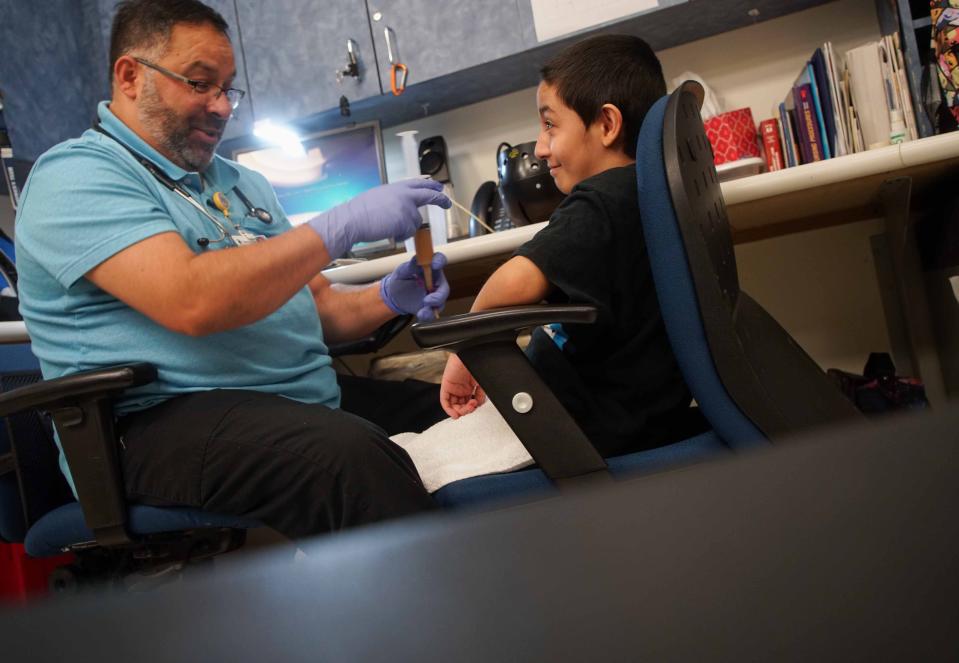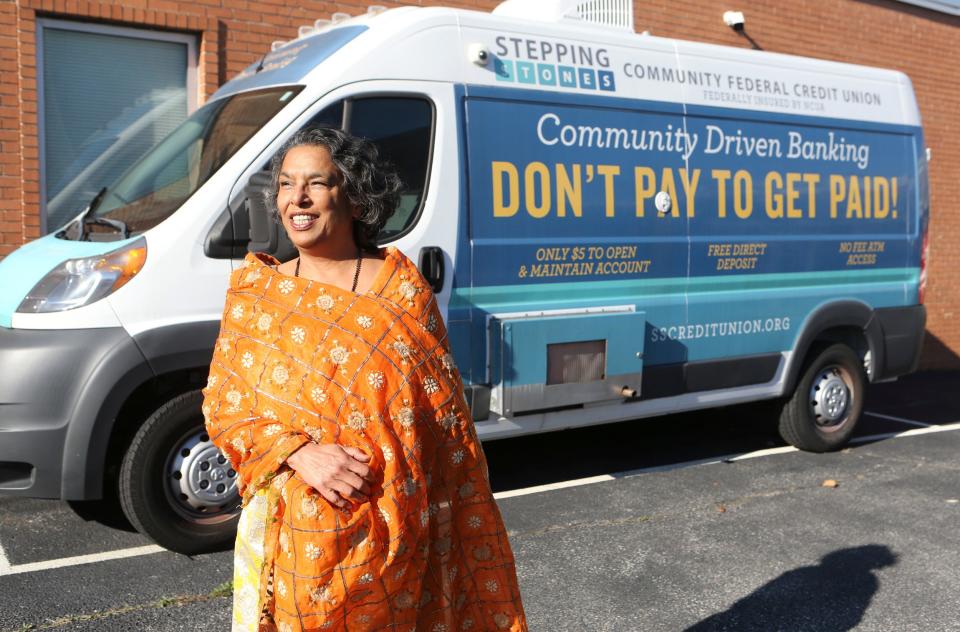5 Delaware organizations seek grant money to impact local communities. Here's how to help.
Delaware has five organizations applying for grants through the Gannett Foundation’s A Community Thrives program. Whether or not they make it to the next step depends on how much they can raise through crowdfunding in the next few weeks.
Organizations in the program are in the running for 16 project grants — including three $100,000 grants, seven $50,000 grants and six $25,000 grants — as well as community operating grants that start at $2,500 each.
To qualify for final consideration, nonprofits must first raise either $3,000 or $6,000 in matching funds, depending on their size.
The crowdfunding program began July 18 and continues through Aug. 12.
Here are Delaware's applicants and how they plan to use the money. Click on the heading of each organization to reach their donating pages.
ChristianaCare Health Services Inc., Wilmington

ChristianaCare serves residents of all ages in Delaware, Maryland, New Jersey and Pennsylvania and centers on improving health outcomes, making high-quality care more accessible and lowering health care costs.
The organization includes an extensive network of outpatient services, home health care, urgent care centers, three hospitals, a freestanding emergency department, and more.
ChristianaCare partners with communities to increase access to care, remove administrative burden and barriers for patients and caregivers and optimize care models to reduce out-of-pocket expenses for patients.
As part of their Community Thrives application, they plan to enhance adolescent and young adult (AYA) oncology care in the mid-Atlantic through a collaboration with Nemours Children’s Health.
This collaborative effort will create a standard to identify, track and manage newly diagnosed AYA oncology patients across the continuum of care, integrate new and existing services, identify and address unique AYA psychosocial issues and enroll new patients into the AYA program.
With current data indicating approximately 3,300 AYA oncology patients in Delaware over the last 5 years, ChristianaCare believes this new collaboration could impact the majority of patients in their program while recognizing possible unmet needs.
Funding from the Community Thrives program would contribute to virtual or hybrid AYA oncology patient networking and focus groups, help implement a mentoring program for younger patients, train dedicated staff to help inform those in inpatient and outpatient settings, develop an AYA oncology consult service to improve treatment and management for patients and more.
Delaware Community Reinvestment Action Council, Wilmington

The Delaware Community Reinvestment Action Council (DCRAC) works to ensure every Delawarean has equal access to equitable resources and high-quality services needed to participate in mainstream banking and legal systems, build financial stability and accrue generational wealth.
They hold Delaware’s big banks accountable for the Community Reinvestment Act commitments and ensure state residents have equitable access to legal and financial systems, and advocate for and operate the Money School, DCRAC Law and Stepping Stones Community Federal Credit Union.
Serving about 3,500 low-income, largely minority Delawareans annually, DCRAC wants to raise money to increase property ownership among minorities. Their project application, titled “advancing minority property ownership through titling heirs’ property and estate planning,” details a plan for resolving tangled land titles for clients and helping them restore their assets.
Based on every $10,000 raised, the organization can take on one new client to bring each property back into its highest and best use and improve the community’s economic well-being.
The DCRAC ensures each client has barriers removed, is economically mobile and is on a path to build wealth, including creating a savings account, guaranteeing sustainable home ownership and taking steps to maintain and preserve their wealth.
Delaware Manufactured Homeowners Association, Millsboro
The Delaware Manufactured Homeowners Association (DMHOA) promotes, represents, preserves and enhances the interests and rights of manufactured homeowners on leased land throughout the state.
The organization works with homeowners, and entire developments, to form new homeowners' associations or protect existing ones and holds training sessions around Delaware.
They also aid homeowners in learning about their rights and obligations, help with rent arbitrations, decrease evictions and remedy issues brought on by the latest economic problems that adversely impact residents such as the pandemic and inflation.
The DMHOA applied for a Community Thrives grant to help enhance their state-wide communications.
Mondy raised from the program would contribute to increasing the group’s communications in the form of mailing material, travel, advertising and media, one-on-one meetings and continued training sessions.
Ingleside Homes Inc., Wilmington
Ingleside Homes Inc.’s mission is to provide affordable housing, healthcare and supportive social services to low- to moderate-income seniors, and has been doing so since 1954.
Some of their services include the Ingleside Retirement Homes since 1971, Ingleside Home Healthcare since 2005 and Ingleside Assisted Living since 2006, which provide independent living spaces to seniors, daily meals, transportation and a variety of other home health activities or supportive social services.
The organization is crowdfunding for their “benevolence” project, a program that provided “gap” funding for critically needed services for the very low-income elderly, which is the difference between government subsidies and the actual cost of the services.
Each year, Ingleside distributes approximately $160,000 to support the program and covers subsidies for three hot meals per day, clothing, transportation, personal care services and items and “gap insurance” to pay for medications.
Ingleside aims to provide shelter, assistance and related living needs for at least 45 frail and low-income elderly citizens, mostly Black, who have been victimized by family through abuse, neglect, theft of their social security or senior benefits and more.
NERDiT Foundation, Wilmington
NERDiT CARES is dedicated to closing the digital divide within communities, while teaching digital literacy, through education, entrepreneurship and social good.
Their efforts exist to advance opportunities in education, careers and entrepreneurship, with wealth consisting of business owners within the communities who continue their mission.
They offer pre-apprenticeship, apprenticeship and device donation and primarily serve low-income populations, minority communities, justice involved and TANF eligible individuals. So far, they have graduated 45 pre-apprentices, with 68% of them men, 32% women and 65% being persons of color.
NERDiT also recycles or donates all devices and equipment used in its programs and assists with record expungement, literacy and language barriers and connecting to post-secondary education.
The organization is seeking a Community Thrives grant for their “NERDiT CARES Workforce Initiative,” a workforce development program targeting communities lacking digital literacy and access. At the end of the program, students graduate with three certifications and hands-on tech repair experience, allowing them to enter the workforce at an entry level IT position or work toward an entrepreneurship opportunity with the NERDiT Ecosystem.
Funding would help the team continue serving a cohort per quarter and allow then to eventually supply even more individuals with their offerings, while expanding their program to other parts of the tech field. Currently, they seek to serve 25 individuals from the ages of 17 to 50.
This article originally appeared on Delaware News Journal: Delaware nonprofits are in the running for thousands in grant money

